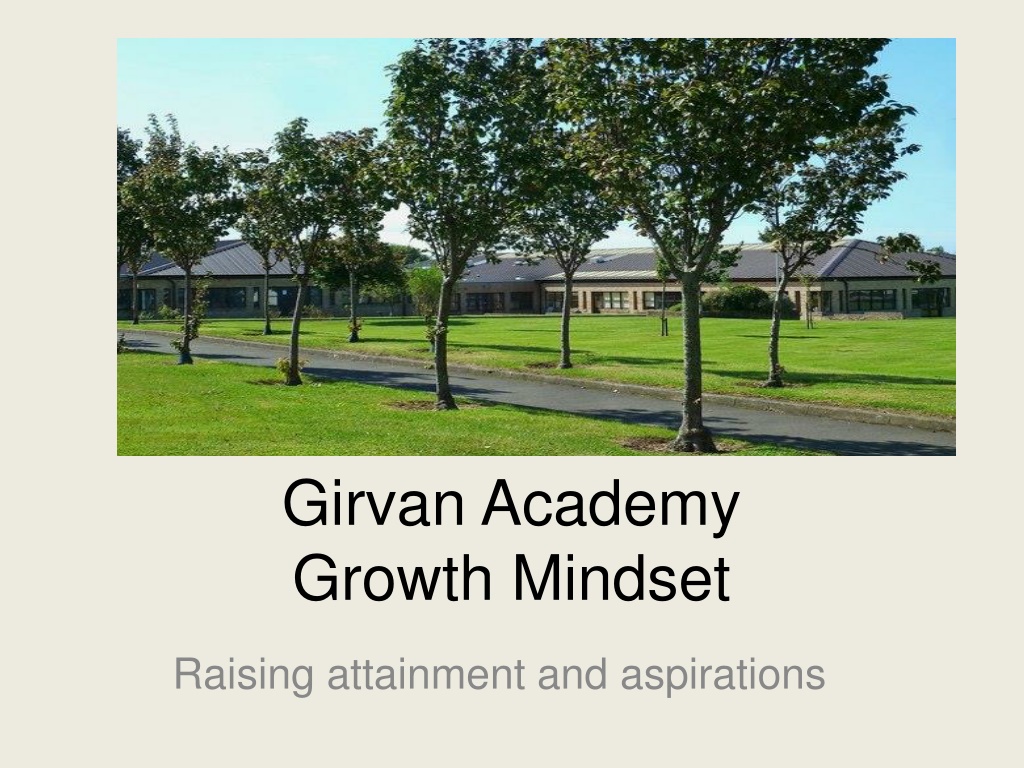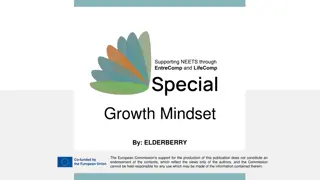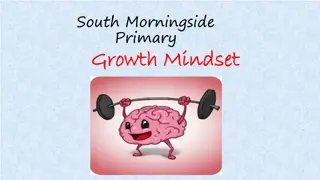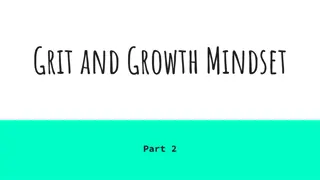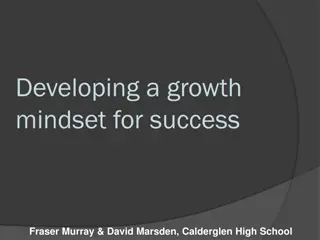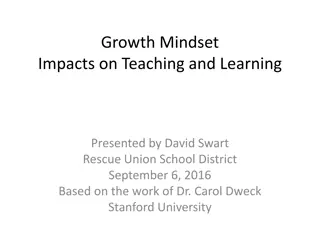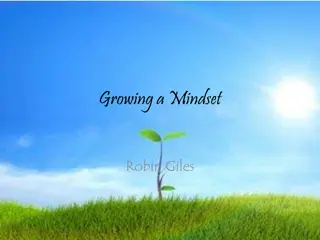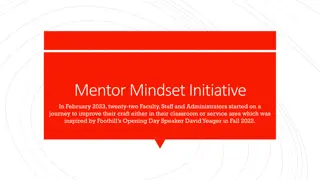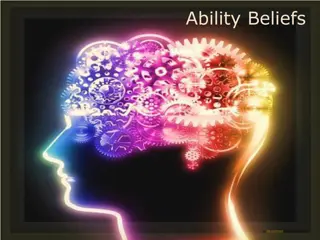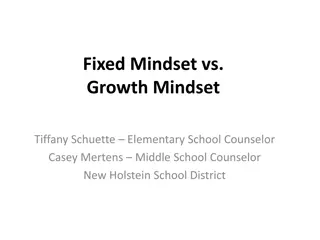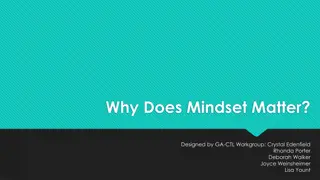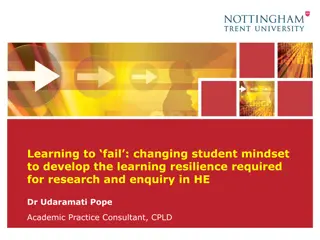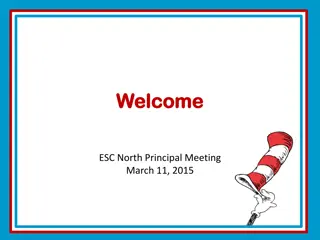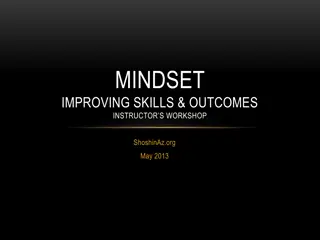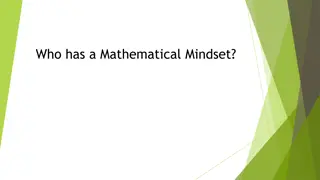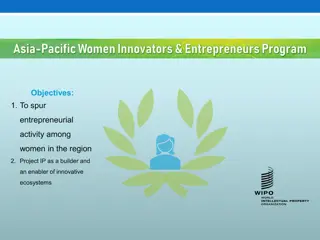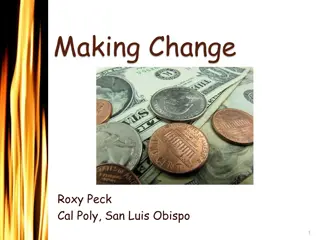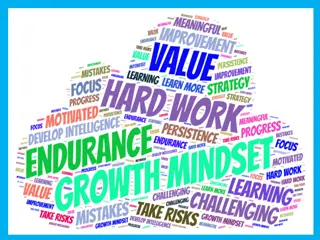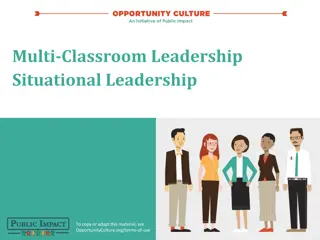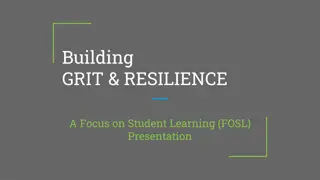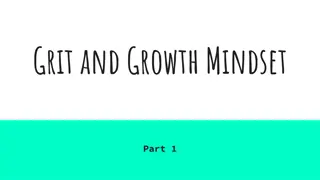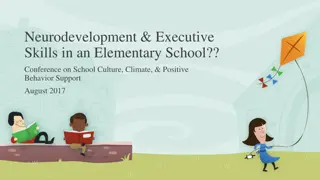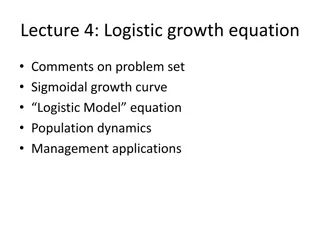Understanding Growth Mindset in School: Importance and Consequences
Explore the impact of fixed vs. growth mindsets on academic goals, values, effort, and reactions to failure in a school setting. Learn how valuing effort can lead to positive outcomes and how mindset influences student attitudes and behaviors towards learning and achievement.
Uploaded on Oct 02, 2024 | 0 Views
Download Presentation

Please find below an Image/Link to download the presentation.
The content on the website is provided AS IS for your information and personal use only. It may not be sold, licensed, or shared on other websites without obtaining consent from the author. Download presentation by click this link. If you encounter any issues during the download, it is possible that the publisher has removed the file from their server.
E N D
Presentation Transcript
Girvan Academy Growth Mindset Raising attainment and aspirations
Consequences of Beliefs Fixed Mindset Growth Mindset Goal in School? Values effort? Reaction to Failure? Blackwell, Trzesniewski, & Dweck 2007
Consequences of Beliefs Fixed Mindset Growth Mindset Goal in School? Look Smart Values effort? Reaction to Failure? Blackwell, Trzesniewski, & Dweck 2007
Consequences of Beliefs Fixed Mindset Growth Mindset Goal in School? Look Smart Learn Values effort? Reaction to Failure? Blackwell, Trzesniewski, & Dweck 2007
Goals Looking smart is most important: The main thing I want when I do my school work is to show how good I am at it. Could also look like put quick answers down with no justification. Learning is most important: It s much more important for me to learn things in my classes than it is to get the best grades. Process rather than product. Growth mindset Fixed mindset Goals? Look Smart Learn Values effort? Reaction to Failure? Blackwell, Trzesniewski, & Dweck 2007
Consequences of Beliefs Fixed Mindset Growth Mindset Goal in School? Look Smart Learn Values effort? No Reaction to Failure? Blackwell, Trzesniewski, & Dweck 2007
Consequences of Beliefs Fixed Mindset Growth Mindset Goal in School? Look Smart Learn Values effort? No Yes Reaction to Failure? Blackwell, Trzesniewski, & Dweck 2007
Value of Effort Effort is negative: To tell the truth, when I work hard at my school work it makes me feel like I m not very smart as I m not seen as a natural. Pupils may look to avoid effort by distracting themselves or others or not even try Growth mindset Fixed mindset Goals? Look Smart Learn Values effort? No Yes Reaction to Failure? Effort is positive: The harder you work at something, the better you ll be at it.
Consequences of Beliefs Fixed Mindset Growth Mindset Goal in School? Look Smart Learn Values effort? No Yes Reaction to Failure? Give Up Work Harder Blackwell, Trzesniewski, & Dweck 2007
Response to Failure Helpless I would spend less time on this subject from now on. I would try not to take this subject ever again. I would try to cheat on the next test. Fixed mindset Growth mindset Goals? Look Smart Learn Values effort? No Yes Reaction to Failure? Resilient I would work harder in this class from now on. I would spend more time studying for the tests. Look for challenges Give up Work Harder
Consequences of Mindsets Fixed Mindset Growth Mindset Goal in School? Look Smart Learn Values effort? No Yes Reaction to Failure? Give Up Work Harder Achievement Lower Higher
What can we do to move pupils from fixed to growth mindsets? We have implemented several strategies which will have a positive impact in shifting mindsets. In true growth mindset spirit, if/when we make mistakes we learn from them and progress. Training Staff Raising profile with pupils Mentoring Language/Reporting Reframing how we think Plans for Cluster working
Initial Steps 2016-17 2 members of staff (E.McE and SI) took part in online CPD course to develop understanding of Fixed/Growth Mindsets. S4 pupils identified as off track with regards to 5@5 were given mentor training Level Achieved Target Significant Improvement Success! Nat 5 (S4) 50% 81% Higher (S5) 40% 75% With only minimal input, we made a big difference. What difference could we make with greater commitment? Whole school approach!
Whole School Approach 2017-18 PEF funding - partnership with [commercial programme] look to support school wide implementation of Growth Mindset. Working group established within the school. Teachers representative from all subject areas as well as pupil representation (now aiming to involve cluster, parents and wider community) Inservice training and full school meeting delivered by [commercial programme] Good practice folder created to share practice across depts Spaces offered to staff for [commercial programme] online course (so far 16 teachers signed up) Strategic plan to drive forward initiatives eg parental involvement etc
Pupils Universal Provision (S1) Baseline information gathered through survey monkey developed by [commercial programme] (PEF) to allow us to gauge any progress Specialist assemblies. Huge impact when pupils understand the science behind it eg Depts linking lessons to Mindset and also displays to draw attention to it
Pupils Universal Provision (S1) S1 PSL Universal Provision - 4-6 week block focused on Mindset. Further understanding of and development of Growth Mindset. Designed to support literacy (R, W T & L) and research skills
Mentoring With the success in 2016/17, we wanted to further develop this and also make it more frequent and sustainable for the school. We have used staff mentors in the past but wanted to do something different - Pupil Mindset Mentors (MM). S6 Peer Educators and identified S4 pupils were given MM training. This comprised of 2 sessions with [commercial programme] Who would benefit from having a Mindset Mentor? Group 1 S4 pupils identified from Tracking and Monitoring as being off track . S6 MM were then allocated S4 off track pupils to mentor Group 2 S1/2 pupils identified from their reflective scoring on the SHANNARI wheel on our wellbeing days. Particular focus on PEF pupils as priority. S4 MM were allocated identified S1/2 pupils MM meet with pupils on a fortnightly basis.
Are our pupils scared to make mistakes? Do our pupils learn from their mistakes? When a pupil makes a mistake, do they see it as confirmation that they are bad at the subject/topic/activity etc (FIXED MINDSET) or do they see it as an opportunity to learn and improve (GROWTH MINDSET)? How do we make that switch? M- Maybe I- I S- Should T- Try A- And K- Keep E- Endeavouring Mistakes are ERIC Expected, Respected, Inspected and Corrected 3 questions to ask after a mistake .. Where did it go wrong? Why did that make it go wrong? What can I do to change it? www.improvement We encourage mistakes, however, if a pupil constantly makes the same mistake without learning then that becomes a decision. WE DO NOT ENCOURAGE BAD DECISIONS. Mistake board - BGE practical class, Senior Phase theory class
Next Steps for Cluster working Cluster representation on Girvan Academy working group Spaces on online course secured through Girvan Academy Link to Transition Events S6 Mindset Mentors delivering assemblies, having mentees in primary school
